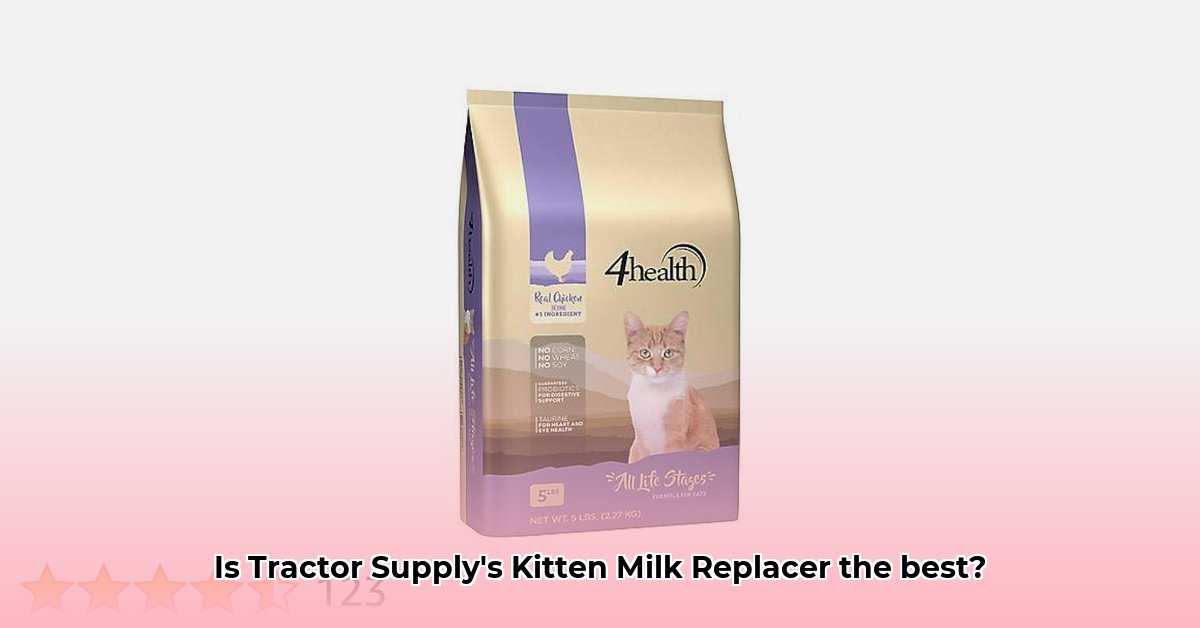
Taking care of a newborn kitten, especially an orphaned or sickly one, can be stressful. This guide provides a step-by-step approach to using Tractor Supply's Kitten Milk Replacer (KMR) to ensure your kitten thrives. We'll cover preparation, feeding, potential risks, and transitioning to solid food. For more on kitten nutrition, check out this helpful resource on kitten food.
Understanding Tractor Supply's Kitten Milk Replacer (KMR)
KMR aims to replicate a mother cat's milk, offering essential nutrients like protein, amino acids (including crucial taurine), vitamins, and minerals. It's a convenient powder you mix with water. However, remember that KMR lacks colostrum, the antibody-rich first milk crucial for a kitten's immune system.
Preparing and Using KMR: A Step-by-Step Guide
Feeding your kitten should be a straightforward process. Here's how to use Tractor Supply's KMR:
Step 1: Precise Mixing: Follow the instructions on the KMR package meticulously. The correct water-to-powder ratio is vital for your kitten's digestive health. Inaccurate mixing can lead to digestive upset.
Step 2: Ideal Temperature: Ensure the KMR is lukewarm. Too hot or too cold can cause discomfort and digestive issues. Think of it like human baby formula – temperature is critical.
Step 3: Feeding Schedule: Adhere to the package guidelines, but tailor the schedule to your kitten's size, age, and activity level. Your veterinarian can create a personalized plan. Frequent, small feedings are generally preferred.
Step 4: Constant Monitoring: Weigh your kitten daily to track growth. Observe their bowel movements and overall behavior for any changes. Any unusual signs warrant immediate veterinary attention. Consistent monitoring is key.
Step 5: Weaning onto Solid Food: Gradually introduce solid kitten food as your kitten grows, following the guidance in the "Transitioning to Solid Food" section. This is a crucial step in their development.
KMR: Weighing the Pros and Cons
Like any product, KMR has advantages and disadvantages. Understanding these helps you make informed decisions regarding your kitten's care.
| Advantages | Disadvantages |
|---|---|
| Readily available at Tractor Supply. | Lacks vital colostrum found in mother's milk. |
| Convenient and easy to prepare. | Long-term health effects are not fully understood. |
| Provides essential nutrients for growth. | Allergic reactions, though rare, are possible. Monitor closely. |
| Generally affordable. | Limited research on KMR's effectiveness in stressed adult cats exists. |
Safety Precautions and Potential Risks
While generally safe, improper use of KMR carries risks. Incorrect mixing, storage, or feeding quantities can cause digestive issues. Always prioritize accurate preparation and monitoring. What are some signs of KMR-related digestive issues you should watch for? (Diarrhea, vomiting, lethargy).
The Importance of Veterinary Guidance
Your veterinarian is your most crucial resource. They provide personalized advice tailored to your kitten's unique needs. Regular checkups are vital for ensuring healthy growth and development. Is it crucial to consult your vet before starting any KMR regimen? (Absolutely.)
Transitioning Kittens from KMR to Solid Food
Weaning kittens is a gradual process, mirroring the transition from breast milk to solid food in human infants. Patience and consistency are essential.
Key things to remember:
- Gradual Introduction: Begin by adding small amounts of high-quality kitten wet food (pate consistency is ideal) to the KMR, gradually reducing KMR as solid food intake increases.
- Monitor weight: Consistent weight gain is a crucial indicator of success. If weight gain is slow, consult your Veterinarian.
- Introduce dry food later: Once your kitten readily consumes wet food, gradually introduce dry kibble, initially softened with water or KMR.
- Observe and Adjust: Pay close attention to eating habits, weight gain, and overall well-being. Adjust food amounts based on your kitten's needs and preferences.
Remember, KMR from Tractor Supply is a valuable tool but not a substitute for proper veterinary care and consistent monitoring. Your kitten's well-being depends on a well-informed and proactive approach. Always consult your veterinarian with any questions or concerns.